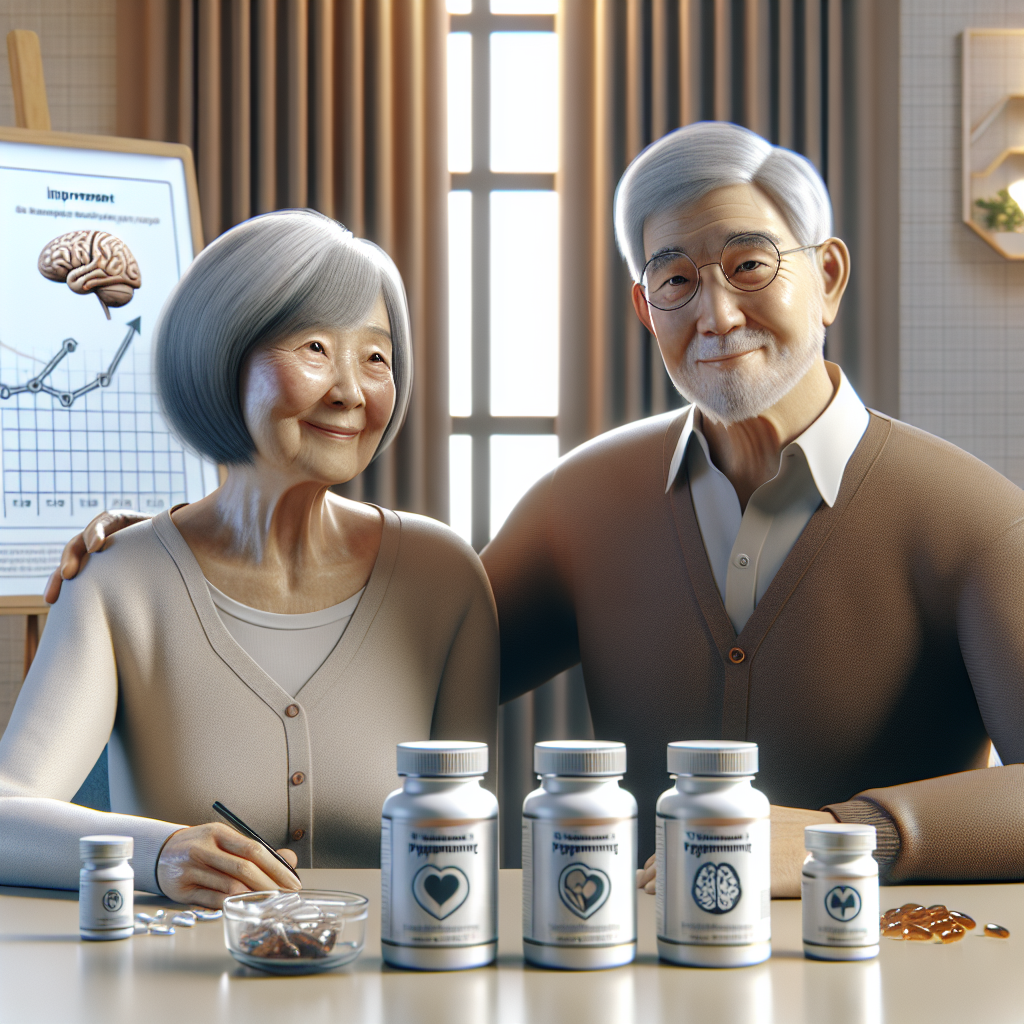Reducing Cognitive Decline in Aging Adults with Targeted Supplements

The Top 5 Supplements for Combatting Cognitive Decline in Aging Adults
As the global population ages, cognitive decline becomes a pressing concern for many. It’s a natural part of aging, but that doesn’t mean it’s entirely unavoidable. Recent research has highlighted the potential of targeted supplements in maintaining or even improving cognitive function in aging adults. This article explores the top five supplements that have shown promise in combatting cognitive decline, offering a beacon of hope for those looking to preserve their mental acuity into their later years.
First on the list is Omega-3 fatty acids, renowned for their anti-inflammatory and antioxidant properties. Found abundantly in fish oil, these essential fats play a crucial role in brain health. They are integral components of cell membranes throughout the body and affect the function of the cell receptors in these membranes. They provide the foundation for developing and maintaining cognitive function and have been linked to a lower risk of dementia and stroke. Omega-3s also facilitate neural growth and provide a protective sheath around neurons, making them a cornerstone supplement for aging adults.
Transitioning smoothly to another vital nutrient, Vitamin E stands out for its potent antioxidant effects. It protects cells from oxidative stress, a key factor in the onset and progression of cognitive decline. Vitamin E can be found in nuts, seeds, and green leafy vegetables, but supplementation ensures an adequate intake to harness its neuroprotective benefits. Studies suggest that Vitamin E may not only slow cognitive decline but also improve memory and cognitive function in older adults, making it a critical component of a brain-healthy supplement regimen.
Equally important is Vitamin B12, a nutrient that supports the maintenance of nerve cells and helps in the formation of red blood cells. Deficiency in Vitamin B12 is common among the elderly and has been associated with memory loss and other cognitive issues. Supplementation can help maintain adequate levels of this vitamin, which is crucial for cognitive health and overall well-being.
Another supplement gaining attention for its cognitive benefits is Ginkgo Biloba, an ancient plant extract used in Chinese medicine for centuries. Ginkgo Biloba is believed to improve blood flow to the brain and act as an antioxidant. These properties may help improve cognitive function, enhance memory and attention, and possibly slow the progression of age-related cognitive decline. While more research is needed to fully understand its benefits, Ginkgo Biloba presents a promising option for those looking to support their cognitive health.
Lastly, Curcumin, the active ingredient in turmeric, has shown potential in protecting the brain against aging. Its anti-inflammatory and antioxidant properties may help reduce the risk factors leading to cognitive decline. Curcumin is thought to cross the blood-brain barrier and has been shown in some studies to lead to improvements in cognitive function. This supplement not only supports brain health but also contributes to the overall reduction of inflammation in the body.
In conclusion, while aging is an inevitable process, cognitive decline doesn’t have to be. Through the targeted use of supplements such as Omega-3 fatty acids, Vitamin E, Vitamin B12, Ginkgo Biloba, and Curcumin, aging adults can take proactive steps towards maintaining their cognitive health. It’s important, however, to consult with a healthcare provider before starting any new supplement regimen, especially for those with pre-existing health conditions or who are taking medications. With the right approach, it’s possible to support brain health and enjoy a vibrant, mentally active life well into the later years.
How Omega-3 Fatty Acids Can Slow Down Age-Related Cognitive Decline

As the global population ages, the quest to maintain cognitive health into later years has become a focal point of both medical research and public interest. Among the myriad of strategies proposed to fend off cognitive decline, the role of dietary supplements, particularly omega-3 fatty acids, has garnered significant attention. This article delves into how these essential nutrients can play a pivotal role in slowing down age-related cognitive decline, offering a beacon of hope for aging adults seeking to preserve their mental acuity.
Omega-3 fatty acids, primarily found in fish oil, are essential fats that the body cannot produce on its own. They are crucial for maintaining overall health, but their impact on the brain is particularly noteworthy. The brain itself is nearly 60% fat, and omega-3s are integral to its structure and function. DHA (docosahexaenoic acid), a type of omega-3, is a major structural component of the cerebral cortex, the area of the brain responsible for memory, language, creativity, emotion, and attention. EPA (eicosapentaenoic acid), another omega-3 fatty acid, plays a critical role in reducing inflammation, which can damage brain cells and contribute to cognitive decline.
Research has consistently shown that omega-3 fatty acids can have a profound effect on cognitive health. Studies indicate that individuals with higher levels of omega-3s in their diet have a slower rate of cognitive decline compared to those with lower levels. Furthermore, omega-3s have been linked to a reduced risk of developing Alzheimer’s disease and other forms of dementia. The anti-inflammatory and neuroprotective properties of EPA and DHA are believed to underlie these benefits, helping to preserve brain function and structure as we age.
Moreover, omega-3 fatty acids are thought to enhance brain plasticity, the brain’s ability to form new connections and pathways. This plasticity is crucial for learning and memory and tends to decline with age. By supporting brain plasticity, omega-3s can help maintain cognitive functions that typically wane as we grow older.
Despite the promising evidence, it’s important to approach the use of omega-3 supplements with a balanced perspective. Not all studies have found omega-3s to be effective in reducing cognitive decline, suggesting that the benefits may vary depending on individual health status, the dosage of omega-3s, and the stage of cognitive decline at which supplementation begins. Therefore, while omega-3 fatty acids offer a promising avenue for supporting cognitive health in aging adults, they are not a standalone solution. A holistic approach that includes a balanced diet, regular physical activity, mental stimulation, and social engagement is essential for preserving cognitive function.
In conclusion, omega-3 fatty acids represent a key dietary supplement with the potential to slow down age-related cognitive decline. Their role in maintaining brain structure, reducing inflammation, and supporting neuroplasticity makes them a valuable component of a comprehensive strategy for preserving cognitive health in aging adults. As research continues to unravel the complexities of the aging brain, omega-3 supplements stand out as a promising tool for those looking to maintain their mental sharpness into their later years. However, it’s crucial to integrate these supplements into a broader lifestyle approach that encompasses a range of health-promoting activities.
The Role of Antioxidants in Preventing Memory Loss Among the Elderly
As the global population ages, the quest to maintain cognitive health into later years has become a focal point for both individuals and researchers alike. Among the myriad strategies proposed to fend off cognitive decline, the role of dietary supplements, particularly antioxidants, has garnered significant attention. This article delves into how targeted supplements, rich in antioxidants, can play a pivotal role in reducing cognitive decline in aging adults, thereby offering a beacon of hope for preserving memory and other cognitive functions among the elderly.
The human brain, a marvel of complexity and function, is unfortunately not immune to the ravages of time. Aging is accompanied by a natural decline in cognitive abilities, including memory, attention, and problem-solving skills. This decline is exacerbated by oxidative stress, a biochemical process that damages brain cells and has been implicated in age-related cognitive impairments and neurodegenerative diseases such as Alzheimer’s. Oxidative stress results from an imbalance between free radicals—unstable molecules that can damage cells—and the body’s ability to counteract their harmful effects with antioxidants.
Antioxidants are substances that can prevent or slow damage to cells caused by free radicals. They are found abundantly in fruits, vegetables, nuts, and whole grains. However, the aging process, coupled with today’s lifestyle and dietary choices, often leads to a shortfall in the necessary intake of these vital nutrients. This is where targeted supplements come into play, offering a practical solution to bridge this nutritional gap.
Research has shown that certain antioxidants are particularly beneficial for cognitive health. Vitamin E, for example, has been shown to protect cells from oxidative stress, potentially slowing the progression of Alzheimer’s disease and other forms of dementia. Similarly, Vitamin C, found in citrus fruits, berries, and green vegetables, not only combats free radicals but also plays a crucial role in the synthesis of neurotransmitters critical for brain function. Flavonoids, a diverse group of phytonutrients present in many fruits and vegetables, have also been highlighted for their antioxidant properties and their ability to enhance memory, learning, and overall brain health.
Moreover, the brain-protective effects of antioxidants are not limited to these well-known vitamins. Minerals such as selenium and zinc, and other compounds like coenzyme Q10 and alpha-lipoic acid, have also demonstrated potential in safeguarding cognitive functions by mitigating oxidative stress. The synergy among these antioxidants can provide a comprehensive shield against the cognitive decline associated with aging.
However, it’s important to approach the use of supplements with caution. While they can offer significant benefits, they are not a panacea and should complement, not replace, a healthy diet rich in naturally occurring antioxidants. Furthermore, the efficacy and safety of supplements can vary, and high doses may have adverse effects. Therefore, it’s crucial for individuals, especially the elderly, to consult healthcare professionals before embarking on a regimen of targeted supplements.
In conclusion, as we navigate the challenges of aging, the strategic use of antioxidant-rich supplements presents a promising avenue for preserving cognitive health. By counteracting oxidative stress, these supplements can help maintain brain function, reduce the risk of neurodegenerative diseases, and enhance the quality of life for aging adults. As research continues to unfold, it is hoped that more precise recommendations will emerge, enabling individuals to make informed choices about their cognitive health strategies.